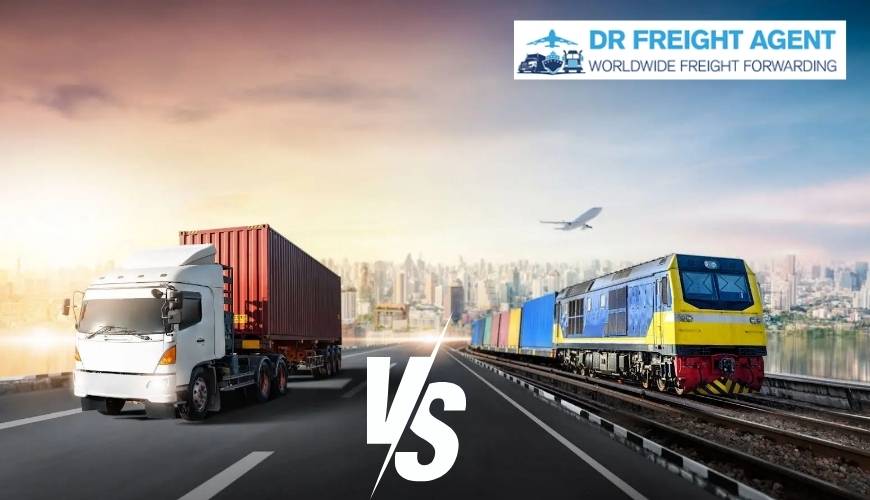In today’s fast-paced world, efficient transportation is the backbone of economic growth. Businesses are constantly looking for cost-effective, reliable, and sustainable freight solutions. When it comes to moving goods, two primary modes dominate the industry: rail transport and road transport. While trucks have played a significant role in logistics, train freight is emerging as the superior option for the future.
In this blog, we will explore the key differences between rail cargo and road transport, highlighting why trains are the future of freight. Whether you’re a business owner, logistics manager, or an eco-conscious consumer, understanding the advantages of rail transport can help you make informed decisions.
The Growing Demand for Train Freight Transport in South Africa
South Africa’s economy heavily depends on efficient transport networks to move goods across vast distances. With increasing demand for train transport, businesses are seeking reliable logistics companies to handle their supply chains.
One such trusted name is DR Freight Agents, providing top-notch rail freight services. Their commitment to seamless logistics solutions makes them a preferred choice for businesses looking for cost-effective and efficient rail cargo transport.
Cost Efficiency: Rail Transport vs. Road Transport
Why Train Freight is More Cost-Effective
One of the biggest advantages of rail freight is its cost efficiency. Moving cargo via trains is significantly cheaper compared to trucks, especially for long-distance shipments. Here’s why:
- Lower Fuel Costs: Trains consume less fuel per ton of cargo transported compared to trucks, making rail freight a more economical option.
- Bulk Transport Capability: Trains can carry massive amounts of goods in one trip, reducing overall transportation costs.
- Less Labor-Intensive: Unlike trucks that require multiple drivers for long-haul routes, trains operate with minimal staffing, cutting down labor costs.
On the other hand, road transport relies heavily on fuel, driver wages, and vehicle maintenance, which increases operational expenses.
Environmental Sustainability: The Eco-Friendly Choice
Reducing Carbon Footprint with Rail Cargo
With climate change becoming a pressing issue, businesses are shifting towards eco-friendly transport options. Train freight produces significantly lower CO2 emissions compared to trucks. Here’s how:
- Trains emit 75% less greenhouse gases per ton-mile than trucks.
- One freight train can replace hundreds of trucks, reducing highway congestion and pollution.
- Rail networks help in decreasing road wear and tear, leading to lower infrastructure maintenance costs.
Choosing train transport over trucks is a step towards a greener, more sustainable future.
Reliability and Safety: Why Rail Freight Stands Out
Fewer Delays, More Security
When it comes to reliability, rail freight surpasses road transport. Train schedules are more predictable, with fewer interruptions due to traffic, weather, or road conditions.
- Fewer Accidents: Rail transport has a much lower accident rate compared to road transport, making it a safer option.
- Less Theft and Damage: Rail cargo is less susceptible to theft and damage since it follows a secured route with minimal external interference.
- Weather-Resistant Operations: Unlike trucks, which can be delayed due to harsh weather, trains operate efficiently in various conditions.
Businesses looking for a dependable logistics company can benefit greatly from train freight transport in South Africa. Explore our services to see how rail transport can improve your supply chain.
Long-Distance Transport: Trains Win the Race
Covering More Ground, Faster
For long-distance transportation, rail transport is the clear winner.
- High Capacity: Trains can move large volumes of goods over long distances in a single trip, making them more efficient than trucks.
- Dedicated Routes: Unlike trucks that share roads with other vehicles, trains operate on dedicated tracks, avoiding traffic congestion.
- Consistent Schedules: Railways follow fixed timetables, ensuring on-time deliveries, which is crucial for supply chain management.
For businesses that require reliable freight solutions, switching to train freight transport in South Africa can lead to improved efficiency and cost savings.
The Future of Logistics: Embracing Rail Transport
A Shift Towards Smart and Efficient Transport
The future of logistics is leaning towards train transport for various reasons:
- Technological Advancements: Smart tracking systems and automation make rail freight more efficient and transparent.
- Government Investments: South Africa invests in railway infrastructure, improving rail networks for connectivity.
- Intermodal Transport Growth: Combining rail and road transport offers a seamless logistics solution, enhancing efficiency.
With the increasing demand for sustainable logistics solutions, businesses should consider making the switch to rail transport. DR Freight Agents offers top-tier rail freight services, ensuring smooth and cost-effective cargo movement.
Final Thoughts: Why Rail Freight is the Future
While road transport has its place in logistics, rail transport is proving to be the more efficient, cost-effective, and eco-friendly option. From reducing carbon footprints to providing reliable and bulk transportation, the advantages of train freight are undeniable. Contact us DR Freight Agent in South Africa.
Businesses looking to optimize their supply chains should explore rail cargo as a viable solution. Partnering with a reputable logistics company like DR Freight Agents can help businesses achieve seamless freight transport with minimal costs and environmental impact.
Are you ready to embrace the future of freight transport? Explore our Train Freight Transport in South Africa and experience the benefits firsthand!
Read More: Sea Freight in South Africa: Insights from Leading SA Freight Forwarders



Leave a reply